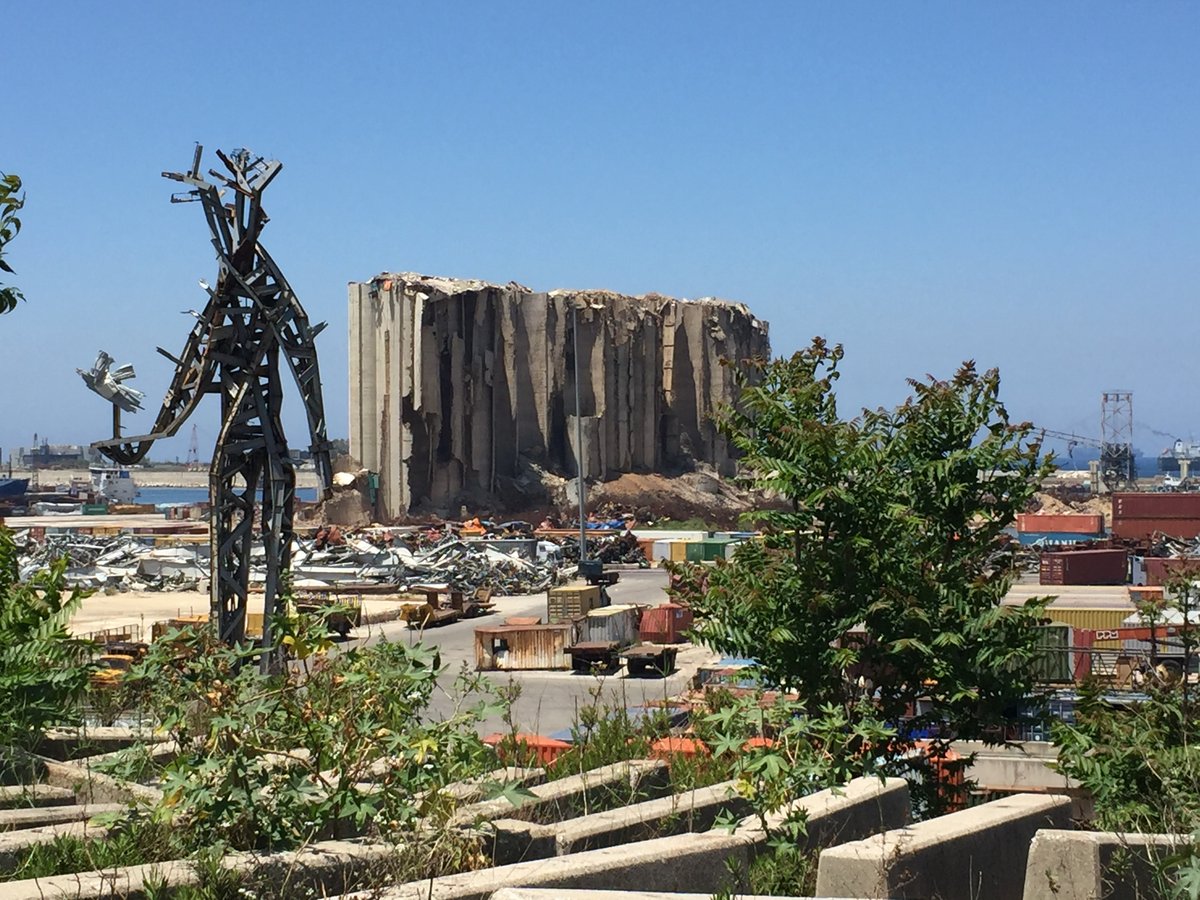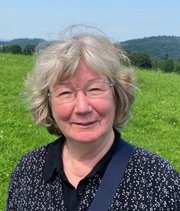The survivors or: In search of a future
“Soft power” supersedes the weak state in Lebanon
by Karin Leukefeld, Beirut
The Lebanese are survivors. The little money they have left is counted and spent only on bare necessities: Rent, electricity from the generator, water, gas for cooking, petrol, mobile phone/internet and food. It becomes difficult when one needs medication or has to go to hospital. Then people say that they are blessed if they have relatives abroad who can help financially. Those who have no relatives abroad count their days. Families move together to save money. You do not live any more, you survive, says one employee. But that is by conviction.
On the way to Burj Hammoud, an Armenian quarter in the east of Beirut, the road passes the harbour. “There were dead bodies everywhere here,” Mohammad B. (name known to the author) recalls the early evening of 4 August 2020, when a red ball of fire suddenly rose into the sky in front of him above the harbour. “I thought the Israeli had bombed the port,” he says. It would not have been the first time. B. was driving east on the Charles Helou expressway when something exploded in the harbour about a kilometre ahead of him, bringing traffic to a standstill.
Slowly, he drove on towards Burj Hammoud and saw a picture of devastation: “Cars had been thrown off the road, bodies were scattered around, in some cars the dead were sitting bent forward over the steering wheel.” There had been blood on the road, strangely deformed vehicles seemed to be attached or stuck to the most impossible places, the air had been dusty and red. When B. arrived at his sister's a little later, a warning was doing the rounds on social networks: “Everyone in Lebanon must stay indoors [...]. The flames indicate that the explosion is nitric acid based. Please all stay inside.”
It was less than two years ago, and every time he drives along Charles Helou, he remembers that day, says B. “Here and here,” he gesticulates, taking hand after hand off the wheel to point right and left. “Everything here was destroyed. This petrol station and here the corner house, and everywhere many corpses.” Now, he says, many buildings have been rebuilt, without the state, “which we do not have anyway”, and with great willpower. He admires his people’s will to survive. The Lebanese have something special in them that enables them to get up again after the heaviest blows and carry on. “They just start again.”
Everything destroyed in five seconds
“Survival gene” is what liquor store owner Joseph D. calls it, adding, “You can call me Joe, call-me-Joe.” He built his shop on Armenian Street with Mary, his wife, he says. “Sometimes we spent the night here, we prepared our food here,” the man says, putting his arm around his wife. “For 15 years we worked on it, and in five seconds everything was destroyed. Can you imagine that? In five seconds!”
The blast wave from the explosion on 4 August destroyed the large glass entrance door and hurled it back into the shop, Mary D. recalls the day. The bottles bursted, lamps fell from the ceiling, she herself had suffered many cuts. She shows a mobile phone picture that a neighbour had taken that day. People in summer clothes walk aimlessly across the street covered with debris, shards and pieces of metal. Water tanks and rubbish bins lie around, the tightly parked cars have disappeared under stones and dust. Then Mary D. can be seen in the video. She is wearing a red blouse and a black skirt and is desperately trying to dial a number on her mobile phone. Blood runs down her forehead, cuts can be seen on her bare arms. Her face is transfixed as she puts her mobile phone away. Then she looks lovingly at her husband and smiles cautiously: “Today I can laugh again, too, but I will never forget that day.”
In search of a future
The Lebanese have no state to rely on. The existing state structures are weak, society is divided. There are many reasons for this, says Marie Debs of the Lebanese Communist Party. Old friends also call her “La Pasionaria”, in memory of the Spanish politician Dolores Ibárruri, who made history as a communist member of the Spanish parliament and with her lifelong commitment.
Marie Debs is not a member of the Lebanese parliament, she is active “on the street” for women's rights and for people to reorganise themselves politically in parties or trade unions. There will only be a change in Lebanon with a new constitution and the end of the confessional system, she says. In the Central Committee of the Lebanese CP, Debs is responsible for coordinating more than 30 left parties from 11 Arab states. “Only if we organise and coordinate can we repel the Western attack on our region, on our self-determination and our resources,” she is convinced, citing the struggle for control of gas resources in the eastern Mediterranean as an example. “If Lebanon can decide about its resources, we can also rebuild the country.”
Today, she says, foreign countries have more influence on political events than Lebanese trade unions, organisations and parties. The reasons for the weak state are, on the one hand, the country's colonial past, the civil war and the fact that intended reforms such as the abolition of the confessional political system and the reconstruction of a productive economy after the end of the civil war (1990) were never implemented.
To this day, Lebanon is dependent on remittances from abroad. The money payments from international institutions, states and communities of states benefit the traditional elites from influential family clans, who conversely – as politicians in the confessional political system – represent the interests of the donors in Lebanon.
All those who do not belong to these elites – by far the majority of Lebanese, regardless of their confessional affiliation – have been seeking their fortune all over the world since the 19th century. Back then, Lebanon was part of Syria, which in turn was a province of the Ottoman Empire. To this day, families work to send their children abroad to build a professional future for themselves. But the Lebanese are attached to their homeland; every year, those living abroad transfer a lot of money to their families. In 1987, private remittances from abroad amounted to 65 % of the gross domestic product. In 2009, these remittances still accounted for 22 % of the gross domestic product. In the meantime, these money flows have largely dried up for the people due to the bank closures in Lebanon, because of the financial crisis and extensive US financial sanctions, especially against Shiite Muslim businessmen.
“Soft power” replaces weak government
The vacuum created by the weakness of the government is being filled by foreign foundations as well as governmental and private non-governmental and development organisations. Aid, childrenʼs and democracy programmes are being promoted, media are being financed, and in the last parliamentary elections candidates “for change” were supported – directly and indirectly. This kind of foreign interference in Lebanon is not new, says Marie Debs.
According to Debs, it is important to help people affected by need and poverty, but the foreign government and private aid organisations make people dependent on themselves. They are an instrument of foreign policy, especially of the USA and Europe, and their allies. Since 2011 and the uprisings in Tunisia and Egypt, one could observe how foreign civil society organisations, foundations and media were spreading Western ideas of reform as “soft power”. Young people are being lured abroad with invitations to seminars and hope for a professional future in a foreign organisation. This influence prevents young people from organising themselves politically in Lebanon and standing up for the interests of their country.
Aid offers with ulterior motives
The rubble after the port explosion in August 2020 had not yet been cleared, the dead, injured and disappeared had not yet been counted, when the “soft power” from abroad built a tent city on Armenian Street. It was not that shelters were built for those who had become homeless, but rather that aid organisations set up tents, ambulances or simply tables and chairs and offered their help.
There was a “Joint Christian Committee for Social Services in Lebanon”, the organisation “Aid Lebanon Now” promoting “change to bring the people forward”, “Rapid Response” had come from Switzerland, and the Turkish “Insan Association Defending Human Rights” also had a stand. Columns of USAID aid workers marched through Armenian Street wearing goggles and hard hats, armed with masks, wheelbarrows, shovels and brooms. Clearly visible on the front and back of their yellow waistcoats was a logo proclaiming “USAID from the American people.”
In mid-May (2022), David Schenker, former Assistant Secretary of State for Near Eastern Affairs at the US Department of State, explained in a video conference statement at the Washington Institute for Near East Policy how fear and distress, disappointment and anger about the absent government are exploited by foreign actors. Mass demonstrations against the economic and financial crisis in 2019 were used to intervene politically with numerous measures. Media were supported, the founding of new civil society groups was financially secured. The aim was to strengthen civil society against Hezbollah, that is why economic offers were made in areas inhabited by Shiites. He personally had dinner with Shiite businessmen and met with “Shiite journalists” reporting on Hezbollah’s “corruption and repression”. The aim was “work for pushing back” Hezbollah’s influence in Lebanon “on all fronts”, Schenker said. One had to “go after [this group] in Lebanon supporting people who are willing to stand up to them…”.
Always have a plan B
Which non-governmental organisation helped them repair the shop, he no longer remembers, says Joseph D., the liquor dealer on Armenian Street. He says he was glad that workmen and materials were paid for, that the glass door in the entrance area, the shelves, the ceiling and the floor could be repaired. To bring in new goods, he had borrowed money from family members. “Our shelves are well stocked again; we hope for the summer and for foreign guests. The Lebanese do not have money to spend on alcohol.”
He really does not know how the Lebanese managed to survive, says Joseph D. “For sure God helps us! But all Lebanese have a special gene, the survival gene,” he says smilingly. “We always have a plan B. When we get up in the morning and leave the house, we have a plan B. We never know what the day will bring for us. What shall we do? After all, we were born here in Lebanon, this is our life.” •
ef. Independent journalist Karin Leukefeld has been reporting from the Extended Middle East for daily and weekly journals as well as German state sponsored radio programmes since the year 2000. Since the beginning of the war in 2011 she moves back and forth between Damasucs, Beirut, other places in the Arab world and her hometown Bonn. She has published several books, such as “Syrien zwischen Schatten und Licht – Geschichte und Geschichten von 1916–2016. Menschen erzählen von ihrem zerrissenen Land” (Syria Between Light and Shadow – History and Stories 1916–2016. People Narrate about their War-torn Country.) (2016, Rotpunkt edition Zurich); “Flächenbrand Syrien, Irak, die Arabische Welt und der Islamische Staat” (Surface Fire Syria, Iraq, the Arab World and the Islamic State.) (2015, 3rd edition 2017, PapyRossa edition, Cologne). Her new book will be released soon: “Im Auge des Orkans: Syrien, der Nahe Osten und die Entstehung einer neuen Weltordnung” (In the Eye of the Hurricane: Syria, the Middle East and the Rise of a New World Order).

